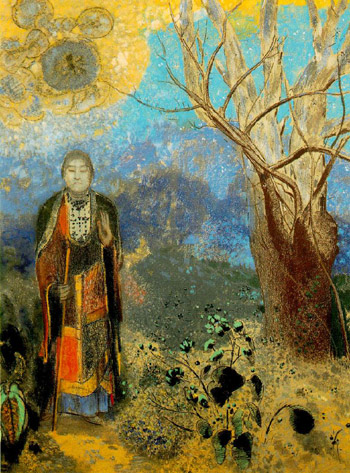
The Buddhaalso known as Le Bouddha

|
The Buddha
In 1905, artist Odilon Redon created ‘The Buddha’, (known in its original language as ‘Le Bouddha’). The image is a perfect reflection of the symbolic transition from Redon’s earlier works, which vastly included plant life with human heads, to his later years, which mainly represented translucent oneness and light.
The scene depicts the Buddha next to an illuminated tree, the two main subjects in the picture, and the only two objects that are well-defined and in focus. The blue and golden hues of the sky, together with the green and yellow shades of the landscape, create a unique blend of colours at the horizon, resulting in a phantasmal setting. The entirety of the image is drawn vertically, from the long, upright limbs of the tree to the standing figure of the Buddha, including the tall, thin staff that he holds between his elongated fingers.
Some believe that the image’s symbolic message is that the path of oneness can be achieved by each and every one of us, and that Redon encourages the viewer to partake in the adventure with him. “My drawings inspire and are not to be defined. They determine nothing. They place us, as does music, in the ambiguous world of the undetermined. They are a kind of metaphor.” – Odilon Redon
Analysis and Review
In response to the assumed symbolic meaning of the artwork, René Huygue shared his opinion in “Real Taking Over”: “The spectator that passes from obscurity to light is no one but each of us. Beyond his own progression, Odilon Redon invites us to become aware of a journey that can be ours. Leaving the obscurity to reach the light, commune with nature to realize the union of the inner being with the outer world, perceiving the silence... That is what the undisputable master of the Symbolist movement is suggesting within such a rich and dense work.”
‘The Buddha’ is located in Musee d'Orsay, Paris, France.












